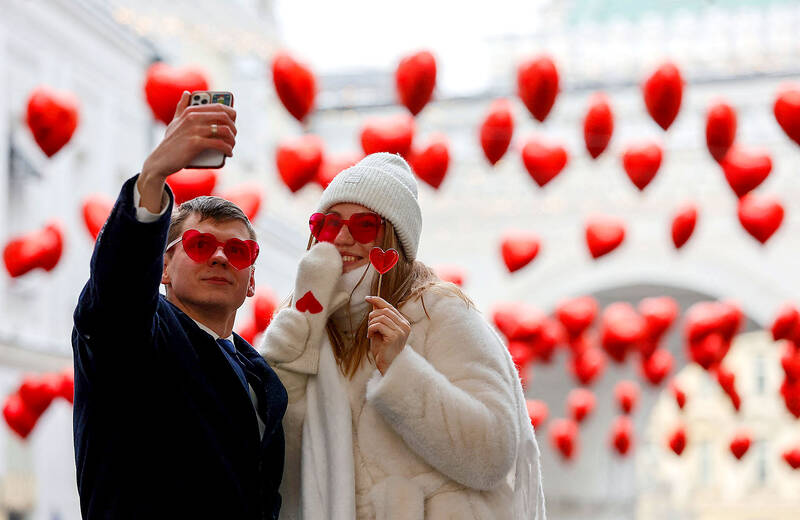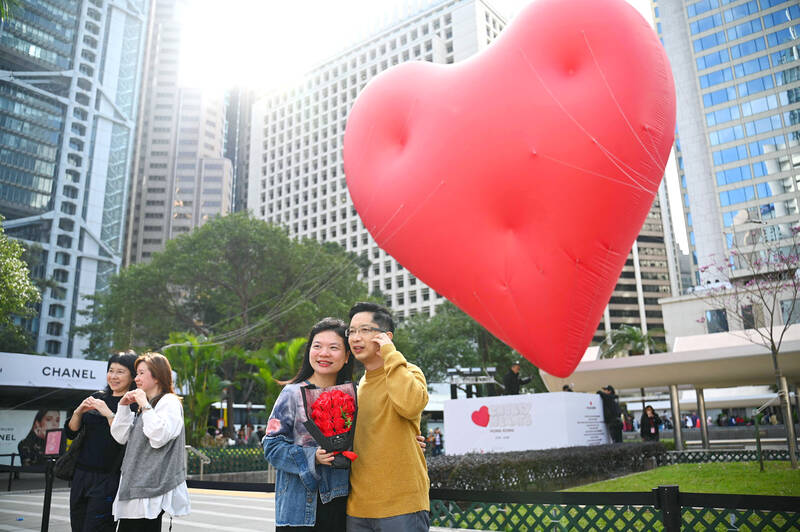Over the past year, a peculiar phrase has begun to litter Asian women’s social media accounts: “Oxford study.”
An Asian woman vlogging about her dating life — and particularly about dating white men — gets commenters reacting to her updates with the words “Oxford study.” A young Asian student showing off her prom dress with her white boyfriend sees “obligatory Oxford study comment” on her TikTok. “I can already hear the oxford study comments coming,” one Asian woman captions a video of her dancing with her white partner.
The phrase “Oxford study” refers to just that: an academic study out of Oxford University. The research is of interest because commenters believe it explores why Asian women, like the women in these posts, date white men instead of men of color.

Photo: Reuters
In most cases, the use of “Oxford study” takes on a ugly tone. Commenters use it to signal a rabid interest in the personal lives of Asian women, informed by entrenched stereotypes around race and gender. They cite the study as a shorthand to criticize the romantic and sexual choices of Asian women in interracial relationships. Many of these commenters are men, often Asian men, and they want to make Asian women the butt of their bad joke.
However, the study they’re so eager to cite doesn’t actually exist — at least, not in the way they think it does. But that hasn’t stopped “Oxford study” from fueling Asian women’s anxiety about dating or affecting their sense of self.
BLAME GAME

Photo: AFP
When an Asian woman decides to date a white man, she knows there is a good chance she will be blamed by some Asian men for what they see as the degradation of their own dating pool. They might cast her as both a victim of white supremacy and a villain for upholding it: yet another Asian woman happy to be in the clutches of a totally ordinary white man. They probably won’t consider how her experiences dating within the Asian community have influenced her decision to date outside it.
Some of them seem to have a critique around Asian fetishes and racialization, but they need to think deeply about their own position
Sophia, 22, began seeing “Oxford study” comments to this effect appear en masse on other women’s videos a few months ago.
“I thought it was such an absurd idea,” she said. “Acting like I’m just a stupid Asian girl who’s going to go chasing after white guys because I don’t have the brains to figure out or navigate through these stereotypes.”
Sophia, whose father is white and mother is Korean, tried to make light of the joke by posting a satirical video with the caption: “POV we make eye contact while I’m commenting ‘Oxford Study’ under my parents’ 25 year anniversary post.”
Then the comments came in.
“I was shocked at the amount of people that took it seriously, and took it seriously in a bad way, where they were like, ‘Finally a Wasian who understands that her existence is wrong,’” Sophia said.
The stereotypes wrapped up in “Oxford study” stem from a long history of Asian women being dehumanized and conceptualized as submissive by white society, and fetishized by white men in particular.
After World War II, the media peddled a binary: Asian women were either the duplicitous, hyper-sexualized Dragon Lady, or Madame Butterfly, a tragic figure of self-sacrifice and chastity, said Wendy Sung, assistant professor of race and digital culture at the University of California, Los Angeles. “As white women within the US became radicalized, questioning traditional gender roles, Asian women were then configured and represented in the white imaginary as the traditional feminine ideal – docile ‘good wives’ who [were] ascribed those very ideals that were being questioned,” Sung said.
The submissive, sexualized perception of Asian women persists. They are stereotyped by demeaning depictions of mail-order brides and comfort women, and eroticized in waifu art. Misogynistic memes about Asian women in interracial relationships abound online — including “Oxford study.”
Sophia has dated both within and outside her race, but “Oxford study” made her more aware of the optics of being seen with white men, even in a peripherally romantic sense.
“I’ve gotten a taste from a lot of my Asian guy friends before, where they are like: ‘How dare you associate with a white guy?’” she said. “The first time I dated a white guy, a lot of the Asian guys in my friend group did say stuff to me — ‘Another case of a hot Asian girl dating an ugly white dude.’”
“It’s like I’m evil, or I’m doing it just to hurt them,” she said.
MEN’S RIGHTS ASIAN
Much of this misogyny is nurtured within men’s rights Asian (MRAsian) groups online, which organize harassment campaigns towards Asian women who date non-Asian people. The groups’ ire stems from another racist stereotype with repercussions in the dating realm: that Asian men are emasculated and unattractive. (Asian men were revealed as one of the least swiped-on racial groups in a 2014 OKCupid report.) Much of the recent derogatory language around the dating habits of Asian women has been coined in the MRAsian space: “WMAF,” or a white male, Asian female relationship; “Lu,” an Asian woman who rejects Asian men in favor of white men; “bananarang,” an Asian woman who used to date white men but now seeks a relationship with an Asian man.
“Some of them seem to have a critique around Asian fetishes and racialization, but they need to think deeply about their own position,” Sung said. “How are they similarly treating Asian women as objects to be possessed rather than respecting the agency, autonomy and humanity of Asian women?”
The groups also misappropriate critical race terminology. To MRAsians, Asian women who choose white men are perpetrators of anti-Asian racism, despite the fact that Asian women are not part of a privileged class and must navigate systems of whiteness every day. “Another asian woman blind to her racism,” one user commented under a video of a creator defending her choice to date white men. “It is funny that only Asian women are the ones saying the study isn’t real, they gotta protect their colonizer,” said another.
This fixation on dating has real impacts on how Asian women approach love and relationships. Dawn, 25, primarily dated interracially in the past, but her most recent relationships were with Asian men. Dating white people is something she and her friends talk about frequently.
“We still sometimes make the same jokes: ‘It’s so common to see an Asian girl with a white boy,’” she said. “If I’m dating a white boy, I’m only feeding into that stereotype. Like, did I get colonized?”
Racialized fantasies put Asian women at risk of online harassment and workplace discrimination, as well as racially motivated shootings, police brutality, and abuse. “It can be incredibly injurious because they are never seen in their multitudes, their whole humanity,” said Sung. This can play out when Asian women date within their race too, said Sung, as Asian men might expect the same kind of docility of their Asian partners.
‘OXFORD STUDY’
The phrase “Oxford study” has been attributed to a TikTok user who in April last year reacted to a video of an Asian woman and white man together by crudely joking: “the power of the Caucasian [male] over the Asian female subconscious needs a full Oxford study.”
“Oxford study” reached its most outrageous zenith a year later. In April, Cherdleys, a comedian and troll, posted a TikTok of him sitting on the back of a pickup truck with his arm slung proprietarily over the influencer Lydia Ren, who kneels on her hands and knees in full-body black latex, a muzzle over her face and dog ears on her head. She is Asian.
“Me and my dog were wondering if you and your dog want to go on a date,” says Cherdleys, who is white.
Commenters swarmed.
“Naw you Asian women love being humiliated by white men,” one wrote, while others frequently, persistently, posted “Oxford study.”
“What level of Oxford study is this?” asked one. “Oxford study final thesis,” and “Oxford study final boss,” wrote others.
The video — surely intended to stoke outrage about Asian women and white men in provocative situations — now has 1.5 million views.
Emily was unnerved to learn that this so-called “Oxford study” had been made up to legitimize scrutiny of Asian women’s personal lives.
“A chill just went down my spine,” she said. Still, many insist that the study is real, because Oxford University’s academic library has a 2010 study called The New Suzie Wong: Normative Assumptions of White Male and Asian Female Relationships in its collection. The co-authors, Murali Balaji and Worapron Worawongs Chanthapan, are not on TikTok, so they were surprised to see their work referenced in this context online.
“Folks have to read the study, which is not necessarily about white men and Asian women in dating relationships,” said Balaji, a lecturer at the Annenberg School for Communication at the University of Pennsylvania.
Their study is about TV advertisement and how it shaped perceptions of romantic relationships between white men and Asian women.
Moreover, they’re not sure their study is even relevant any more. Worawongs Chanthapan, who is an assistant professor of public relations at California State University, Long Beach, said that the modern understanding of Asian masculinity has undergone big changes since 2010, as more Asian men step into the spotlight as celebrities and take on the heartthrob mantle.
“With the increasing representation of Asian and Asian Americans in the media, such as Marvel films and the K-pop phenomenon, we are starting to see stereotypes of Asian men being redefined,” she said.
Neither co-author believes there should be a study interrogating why Asian women date white men. Instead, Worawongs Chanthapan thinks it is important to “continue exploring how discussions like this on social media platforms such as TikTok impact Asians’ perception of themselves along with the relationships they form.”
“We need to look now at how both Asian men and women can develop healthy self-conceptions without feeling like they have to measure themselves by mediated standards of beauty and self-worth,” Balaji added.
Sophia has some level of empathy for Asian men who feel rebuffed by modern dating culture, despite how invalidating it feels to be on the receiving end of their outrage. “I agree that that’s unfair, but I also think it’s unfair to take it out on Asian women who are just dating whoever they choose,” she said. “It’s just weird to take it out on us instead of people in society who are being racist towards Asian men.”
“I’m a victim of this too,” she added.

Climate change, political headwinds and diverging market dynamics around the world have pushed coffee prices to fresh records, jacking up the cost of your everyday brew or a barista’s signature macchiato. While the current hot streak may calm down in the coming months, experts and industry insiders expect volatility will remain the watchword, giving little visibility for producers — two-thirds of whom farm parcels of less than one hectare. METEORIC RISE The price of arabica beans listed in New York surged by 90 percent last year, smashing on Dec. 10 a record dating from 1977 — US$3.48 per pound. Robusta prices have

A few years ago, getting a visa to visit China was a “ball ache,” says Kate Murray. The Australian was going for a four-day trade show, but the visa required a formal invitation from the organizers and what felt like “a thousand forms.” “They wanted so many details about your life and personal life,” she tells the Guardian. “The paperwork was bonkers.” But were she to go back again now, Murray could just jump on the plane. Australians are among citizens of almost 40 countries for which China now waives visas for business, tourism or family visits for up to four weeks. It’s